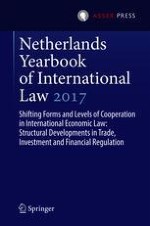2018 | OriginalPaper | Buchkapitel
12. The UN Guiding Principles on Business and Human Rights in (National) Action: The Dutch Agreement on Sustainable Garment and Textile
verfasst von : Antoine Duval, Enrico Partiti
Erschienen in: Netherlands Yearbook of International Law 2017
Verlag: T.M.C. Asser Press
Aktivieren Sie unsere intelligente Suche, um passende Fachinhalte oder Patente zu finden.
Wählen Sie Textabschnitte aus um mit Künstlicher Intelligenz passenden Patente zu finden. powered by
Markieren Sie Textabschnitte, um KI-gestützt weitere passende Inhalte zu finden. powered by
